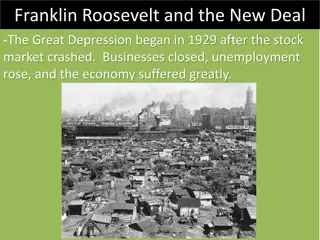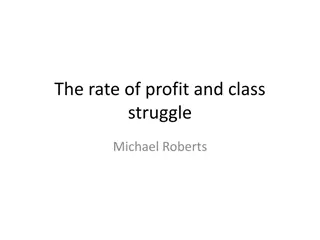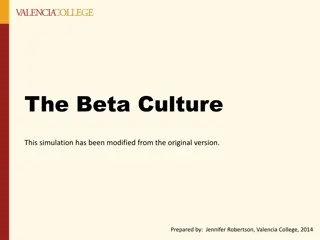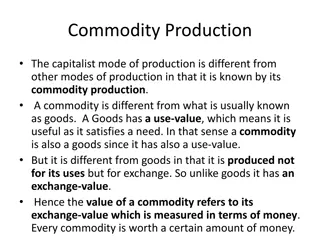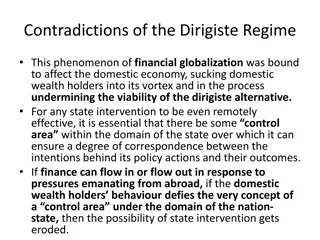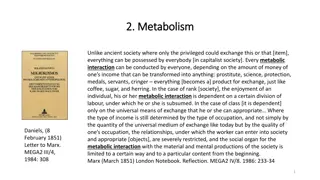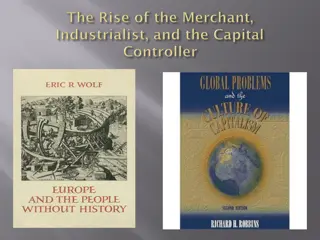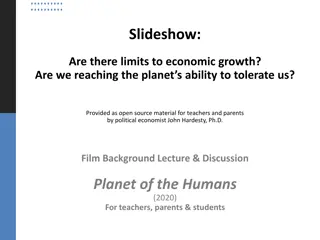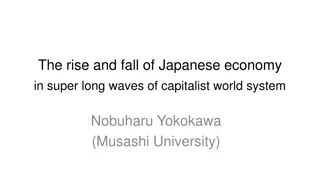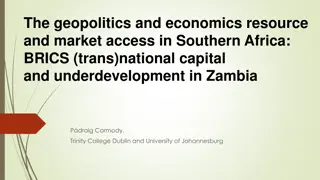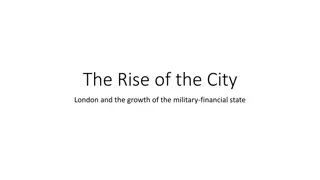Society 5.0 - Co-creating the Future
The concept of Society 5.0 for SDGs in this informative presentation by NAKAJIMA Koh, Deputy Director at Keidanren (Japan Business Federation). Discover how technological advancements and digital transformation are shaping the future of society, and the role of social partners in creating a data-dri
17 views • 37 slides
Uncovering the Violent History of Capitalistic Enclosures
Explore the historical context of capitalist enclosures, their violent impacts on peasants, and the moral justifications used to conceal these atrocities. Delve into how economic narratives created moral bubbles to justify violent acts, as examined through the lens of Marx's analysis. Unveil the par
1 views • 11 slides
Latin America Society of American Nuclear Society - Overview and Governance
The Latin American Section of the American Nuclear Society (LAS/ANS) was established in 1975 to represent nuclear professionals across Latin America. It focuses on promoting nuclear science and technology in various fields, facilitating research and education, organizing technical meetings, and fost
3 views • 43 slides
Understanding Markets and Economic Structures
Markets play a crucial role in bringing buyers and sellers together for transactions. This article discusses the concept of markets, different types of markets in a capitalist economy, focusing on perfect competition. It outlines the features and conditions of perfect competition, emphasizing the im
2 views • 42 slides
Understanding Economic Systems and Sectors
An economic system is a mechanism through which the government plans and allocates resources and services. Types include capitalist, socialist, and mixed economies, each with distinct characteristics. The central problem of the economy is managing scarcity. The economic sector comprises the primary,
2 views • 5 slides
Understanding Civil Society: Concepts, Challenges, and Implications
Explore the dynamics of civil society, from its dense network of groups to its role in democracy. Delve into the typology of Civil Society Organizations, the connection between civil society and democracy, and the unique landscape of civil society in Norway. Engage in thought-provoking discussions o
0 views • 9 slides
Walt Whitman Rostow's Model of Economic Growth - A Historical Perspective
Walt Whitman Rostow, an economist, proposed the Stages of Economic Growth theory in 1960, outlining the five stages through which countries pass to achieve economic development. His model reflects Western capitalist ideologies and was influenced by Cold War politics. Rostow's theory aimed to guide d
0 views • 19 slides
Exploring Responsibility and Social Change in 'Young and Old' Play
In the play "Young and Old," the characters Eric, Sheila, and Gerald represent the younger generation, while Arthur and Sybil symbolize the older generation. The story delves into the concept of responsibility, highlighting the different attitudes towards Eva's death. Arthur and Sybil, despite being
0 views • 9 slides
The Formation of Intellectuals in Society: Insights from Gramsci
Intellectuals are individuals who utilize their intellect and specialized education to generate ideas and knowledge essential for the functioning of societal production systems. Gramsci delves into how different social groups or classes form their own intellectuals, highlighting processes, historica
0 views • 20 slides
Understanding Socialism: A Comprehensive Overview
Socialism is a political and economic ideology that advocates for collective or state ownership of production, distribution, and exchange. It emerged in the early 19th century as a response to industrial capitalism, aiming for a more egalitarian society that prioritizes collective well-being. Social
0 views • 9 slides
The Significance of Money in a Capitalist Economy
Money plays a crucial role in a capitalist economy by facilitating the price mechanism, consumption decisions, production activities, and income distribution. It enables rational choices for consumers, trade organization for producers, and serves as the basis for credit systems. Without money, the c
1 views • 5 slides
Understanding Capitalism, Modernism, and Postmodernism in Literature
Terry Eagleton's essay delves into the impact of capitalism on art and literature, exploring the emergence of modern and postmodern literature in the capitalist and late capitalist eras. He discusses how late capitalism influences art with characteristics like mass consumerism and virtual reality. P
1 views • 7 slides
Examining State-Level and Dyadic Explanations for War in Global Politics
Understanding the reasons why certain states are more war-prone than others involves exploring factors such as economy, internal opposition, and political systems. Marxist explanations argue that capitalist economies are more prone to war due to issues like overproduction, wealth inequality, and imp
0 views • 17 slides
Evolution of Liberal Citizenship Theory
The liberal theory of citizenship emphasizes the essential components of right, responsibility, and identity within a political community. It contrasts with pre-capitalist societies by offering a weak sense of membership and reduced citizen obligations. The addition of social rights has brought an e
0 views • 15 slides
Franklin D. Roosevelt and the New Deal During the Great Depression
The Great Depression of 1929 led to high unemployment, closed businesses, and economic suffering. President Hoover's laissez-faire policies failed to address the crisis adequately. In the 1932 election, FDR introduced the New Deal with a focus on Relief, Recovery, and Reform to combat the Depression
2 views • 13 slides
Perspectives on Youth Culture Through Functionalist and Neo-Marxist Views
Functionalist and Neo-Marxist perspectives on youth culture offer contrasting views on its purpose in society. Functionalist theorists emphasize the role of youth culture in providing a transitional phase for young people, aiding in their social integration and development of independence. On the ot
0 views • 11 slides
Building Socialism: Strategies for Social Change and Political Action
Explore the process of social change towards socialism through mass action, organization, and the building of a socialist party. Emphasizing the importance of campaigns, reforms, and transitional methods, the journey involves uniting the working class, challenging the capitalist system, and particip
4 views • 10 slides
Understanding the Law of Profitability in Capitalist Accumulation
Explore the relationship between the rate of profit, class struggle, and capitalist accumulation. From the general law of accumulation to the law of profitability, examine how displacing labor affects the average rate of profit and learn about Marx's law of profitability. Discover the evidence from
0 views • 17 slides
The Beta Culture Overview and Cultural Guidelines
The Beta Culture is characterized by a capitalist society focused on individual wealth accumulation, valuing hard work and equality. Social norms dictate greetings with a nod, avoiding discussion of wealth or family, and a unique trading language for engaging in transactions. Betans prioritize perso
0 views • 4 slides
The Role of Corporate Law in Wealth Distribution and Capitalism
Exploring the evolution of corporations within capitalist frameworks, this analysis delves into the intertwined concepts of managerialism, infinite wealth accumulation, and the social-historical embeddedness of corporations. Through historical contexts and theoretical perspectives, the discussion de
0 views • 17 slides
Labor Super-Exploitation and Value Transfer in Global Economy
Original research explores how labor super-exploitation and transformation drive international value transfer in the capitalist system. The study bridges orthodox Marxist and Ricardian perspectives, offering new insights into unequal exchange and imperialism.
1 views • 21 slides
Understanding Commodity Production and Labor in Capitalist Mode
The capitalist mode of production is characterized by commodity production, where goods are produced not for their use but for exchange. The value of a commodity is determined by its exchange value, measured in money, which is influenced by the quantity of labor involved in its production. Labor, be
0 views • 8 slides
Exploring the Moral Foundations of Capitalism
Delve into the historical origins and ethical principles underpinning capitalism as seen through iconic quotes, foundational texts, and philosophical analysis. Understand the intertwined concepts of liberty, economics, philosophy, and ethics that shape capitalist ideology and practices, emphasizing
0 views • 42 slides
Economic Transformations in Latin America during the Late 19th Century
The late 19th century in Latin America marked a period of significant economic changes driven by a global context that included events like the Great Depression of 1873-1896 and the second industrial revolution. Core capitalist powers sought cheap raw materials, labor, and new markets, leading to in
1 views • 17 slides
Enhancing Civil Society Engagement in the Global Financing Facility (GFF)
Explore key tools and strategies for enhancing civil society engagement in the GFF, including the Civil Society Engagement Strategy, guidance notes, CSO resources, and the value of civil society in RMNCAH+N. Learn how civil society can contribute to advocacy, monitoring, accountability, and more tow
0 views • 16 slides
Challenges of the Dirigiste Regime in Financial Globalization
The Dirigiste regime faced contradictions in the context of financial globalization, impacting domestic wealth holders and the effectiveness of state interventions. Internal contradictions and the need for state involvement in infrastructure development and economic regulation further complicated th
0 views • 12 slides
Critique on Educational Systems and Social Inequality
The content explores how current educational approaches, student assessments, and the capitalist influence in education contribute to social inequality. It discusses the role of education as an equalizer, challenges the meritocracy assumption, and highlights how schools can perpetuate economic dispa
0 views • 6 slides
The Cold War and Its Impact: Truman Doctrine, Marshall Plan, and Iron Curtain
The Cold War emerged from the tensions between the Communist Soviet Union and the Capitalist Democratic US and its allies after WWII. The conflict led to the Western Bloc led by the US and the Eastern Bloc led by the Soviets. The US implemented the Truman Doctrine and Policy of Containment to preven
0 views • 14 slides
Unveiling the Dirty Secrets of Capitalism by Nick Hanauer
Nick Hanauer, a successful capitalist, sheds light on the flaws of capitalism and neoliberal economic theory, emphasizing the need for regulatory changes to benefit the majority. He challenges the assumptions of market capitalism and advocates for a new economic approach focused on cooperation and s
1 views • 25 slides
Understanding Metabolic Interaction in Society
In a capitalist society, metabolic interactions and exchanges are influenced by one's income and occupation quality. This separation between human existence and nature is emphasized in the relation between wage labor and capital. Marx's writings highlight how labor is essential for the metabolic int
0 views • 6 slides
The Emergence of Capitalism and Global Trade Dynamics
European expansion from the 15th century onwards saw the rise of a commercial network on a global scale, driven by a blend of economic interests and political power. The capitalist system evolved through strategic trade, market expansions, and a regional division of labor. The movement of goods and
0 views • 58 slides
Limits to Economic Growth and Planetary Sustainability: A Thought-Provoking Investigation
Exploring the concept of limits to economic growth and the Earth's capacity to withstand human impact, the documentary "Planet of the Humans" sheds light on key ecological economics propositions. It delves into the tensions between capitalist profit-seeking and environmental sustainability, highligh
0 views • 45 slides
The Evolution of Bourgeois Politics in 17th Century England: Insights from Hobbes and Locke
The emergence of bourgeois politics in 17th century England marked a significant shift in power dynamics as capitalism began to take hold. The bourgeoisie initially allied with the monarchy to overthrow the feudal order but later turned against the royal power. The Puritan Revolution and the Gloriou
0 views • 20 slides
Exploring Commodity Frontiers and Urbanization in Brazilian Cinema and Literature
The texts "Inferno" by Patricia Melo and "City of God" directed by Fernando Meirelles and Kátia Lund depict the shaping of Rio's history by commodity frontier movements in Brazil. These movements include the migration of people to cities due to agricultural crises, emergence of drug trade, particul
0 views • 19 slides
Contrasting Early Colonial Regions in America
Early New England, Middle, and Southern colonies differed in economics, geography, culture, government, and relations with American Indians. New England focused on subsistence farming and democratic town meetings. The Middle colonies benefited from fertile land and trade along rivers. The Southern c
0 views • 13 slides
The Rise and Fall of Japanese Economy in Capitalist World System
After the financial crisis of 2007 marked the beginning of the end of the postwar capitalist world system, a period of discontinuity emerged, signifying an opportunity to create a more stable economic system. By analyzing the long and super long waves of capitalist economy, particularly focusing on
0 views • 24 slides
BRICS Influence on Development and Geopolitics in Southern Africa
This study explores the impact of BRICS nations on development outcomes in Africa with a focus on Zambia. It examines how BRICS engagement may create space for developmental states or reinforce neoliberal tendencies. Additionally, the analysis delves into the geopolitics of BRICS involvement, partic
0 views • 11 slides
A Brief History of Communism: From Capitalism to Karl Marx's Vision
The history of communism traces back to the capitalist system's exploitation of workers in the mid-1800s. Karl Marx's vision, outlined in "The Manifesto of the Communist Party," aimed for economic equality and worldwide revolution. The inherent flaws of capitalism were critiqued, leading to the rise
0 views • 17 slides
The Evolution of London: Military-Financial State to Capitalist Metropolis
The rise of London as a military-financial state led to the growth of the aristocracy and state capitalism. The dissolution of monasteries fueled the rise of gentry and landholders, with practices like enclosure and rent-racking becoming common. The development of the credit system and the legalizat
0 views • 12 slides
Understanding China's Bureaucratic Capitalism and State-Directed Economy
China's approach to capitalism under Deng's reform embodies state-directed capitalism, characterized by central control over economic reforms while maintaining a non-democratic political system. This model has led to the rise of a bureaucratic capitalist regime with state-backed companies dominating
0 views • 11 slides














